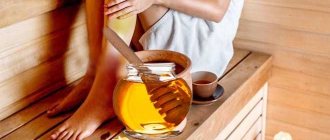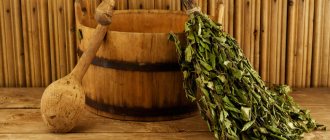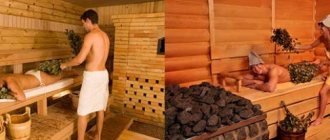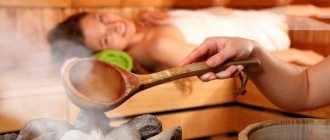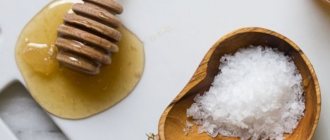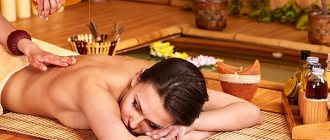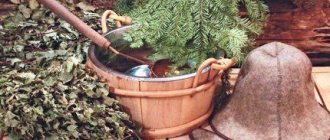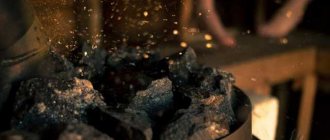With the onset of calendar winter, relaxation in a bathhouse or sauna, traditional for many of us, is becoming increasingly popular. Below are tips on how not to harm your body and get the maximum benefit from this procedure.
While in a sauna, our body is capable of losing from 1.5 to 2 liters of water, so it is so important to replenish lost fluid, even if the purpose of visiting the steam room is to lose weight. Modern bath complexes and spa centers are equipped with bars or full-fledged cafes and offer their visitors eat, drink and sometimes drink. But if you can do without food while visiting the sauna, then prolonged exposure to high temperatures without additional fluid intake can lead to disastrous consequences. Dehydration can lead to headaches, poor circulation and even loss of consciousness.
Rules for drinking drinks in the bathhouse
When carrying out procedures in a bathhouse or sauna, a certain drinking regimen is provided, which must be observed for health benefits. It includes the following rules:
- The optimal choice for saunas and baths is acidified liquid of moderate temperature (from 25 to 60 degrees). It can quickly quench thirst and replenish the necessary supply of water in the body.
- You need to drink liquid moderately and in small sips, while chilled drinks will warm up to body temperature, and hot drinks will cool down.
- It is not recommended to drink drinks with ice, which can create an unnecessary contrast between increased body temperature and liquid.
- You should not drink large amounts of liquid at one time. The best option is from 200 to 400 mg per hour. This is enough to replenish the necessary water supply in the body.
- Taking small, frequent fluids is best for maintaining hydration.
- It is recommended to exclude alcoholic drinks when visiting the steam room.
What to drink in the bath to get maximum benefits for the body? There is only one answer – tasty and healthy drinks, the choice of which is extremely large.
Getting ready to go to the sauna.
All day, on the eve of your visit to the sauna, you need to drink a lot of liquids, especially mineral water, and eat easily digestible foods, avoiding heavy and fatty foods. The last meal should be 2 hours before visiting the steam room. It is better to use natural mineral water without gas as a drink. Natural juices, fruit drinks, herbal teas and kvass are also suitable. You will have to stop drinking black, green tea and coffee. All alcohol is prohibited. Neither before the sauna, nor directly during your stay in it, drinking alcoholic beverages is not only prohibited, but also dangerous to your health.
Toning teas: green and black
Bath tea is one of the most popular drinks that can be consumed both before the start of the procedures and after their completion. Black tea with a little sugar will invigorate and give you strength.
To fill the body with energy, it is enough to take moderately strong black tea, chilled or warm.
Iced tea will cool and refresh a warm body, while warm tea will speed up sweating and the elimination of toxins.
No less popular is green tea in the bath. It can be prepared with the addition of honey, milk or ginger. This is a wonderful remedy for quenching thirst and cleansing the body. People with blood pressure problems should not overuse green tea.
In general, green and black tea has a good effect on human health, improves metabolic processes, removes waste and toxins, strengthens the immune system, improves mood and well-being.
Various types of tea contain more than 300 unique chemical components that have powerful anti-inflammatory, hemostatic and strengthening effects. In addition, teas can improve the functioning of the digestive system, central nervous system, heart and kidneys.
Hot tea after a bath promotes rapid relaxation, rest and recovery. A fragrant slice of lemon or a teaspoon of sugar syrup added to warm tea will turn it into a light tonic drink.
Why does a sauna help with a hangover?
A hangover is largely poisoning from the breakdown products of alcohol. Mainly acetaldehyde. It is this toxic substance that alcohol is converted into in the body, thereby causing headaches, nausea, trembling, etc. Acetaldehyde disrupts liver function by slowing down the elimination of ethanol metabolic products, which leads to the accumulation of acetic acid in the body. Acetaldehyde also slows down redox reactions, thereby inhibiting the oxidation of other substances. Fatty acids, glycerol, and pyruvic acid accumulate in the blood plasma.
The bath activates blood circulation and metabolism. High temperature increases the concentration of the hormone cortisol in the blood plasma, which stimulates the production of glucose in the liver. This allows you to restore energy faster. (Read more about the relationship between the liver and hormones, as well as ways to reduce the risk of hormonal imbalances in a separate article.)
The sauna relieves hangovers by causing profuse sweating, which opens the pores and removes harmful metabolic waste from the body. The bath also speeds up metabolism. A visit to the bath increases skin respiration, improves blood circulation (in particular, it activates the activity of capillaries).
Dehydration is eliminated: fluid from the intercellular spaces is removed into the bloodstream, which means that swelling in those who are “swollen from a hangover” will be relieved. In addition, high temperature kills bacteria on the human body. Those who have at least once been to a bathhouse do not need to be told what a good mood and good nature a person has who has just taken a steam bath: vigor and new strength are guaranteed.
Read interesting and funny articles on our blog! * Excursion to the museum. Story.
* How the sommelier specialization was formed.
* Okhlobystin accused the Russians of Efremov’s alcoholism
How to properly go to the sauna with a hangover
Go to the sauna. Recommended scheme: three sessions of 5, 10 and 20 minutes.
If you have a hangover, a Russian steam bath is not recommended, as it puts a lot of stress on the cardiovascular system. And in general, you shouldn’t abuse steam.
In what cases will a bath with a hangover be harmful?
It is not recommended to go to the sauna if your blood pressure is above 140/90 or your pulse is above 110 beats per minute. Such indicators are typical for those who suffer from alcohol addiction or have been drinking for a long time.
If you are not sure that everything is fine with your heart, it is better to replace the bath with a salt bath.
Revitalizing herbal tinctures and decoctions
Herbal teas, tinctures and decoctions are another category of equally popular drinks that can be drunk in a sauna or bathhouse. It features drinks made from medicinal herbs and berries.
Herbal tea for baths is absolutely not inferior to traditional teas in its healing characteristics. Such mixtures contain a large number of active components that help replenish water balance and improve the biochemical parameters of the body.
Thus, the most popular are teas brewed with field herbs - chamomile, thyme, lemon balm, mint and St. John's wort. Also used are flowers, leaves of shrubs and trees - linden, raspberry, viburnum, rose hips, strawberries, blackberries, elderberries and blueberries.
When using medicinal herbs, what tea is best to drink in a bath?
- Tonic tea. It restores strength well and energizes. To prepare the drink, blueberry, strawberry, lingonberry and wild strawberry leaves are used, as well as rose hips.
- Soothing tea. Affects the central nervous system and muscles, relieves fatigue and irritability. Chamomile, lemon balm, mint, St. John's wort and oregano are used for brewing.
- Breast tea. Good for diseases of the lungs and bronchi, eliminates prolonged cough. The main ingredients are coltsfoot leaves, plantain and licorice.
- Sweatshop tea. Used to quickly warm up the body and increase sweating. Sudorific bath tea can be prepared from linden and raspberry inflorescences.
Herbal teas
Herbal tea is very famous among people. It is used as a medicine, girls use it for weight loss, and older people use it for cleansing.
The most useful herbal teas are those brewed from natural herbs, collected somewhere in the forest with your own hands. Among the most common herbs from which teas are brewed are mint, lemon balm, chamomile, rose hips, raspberry and strawberry leaves.
There are a great many recipes for herbal teas. Again, this is a matter of taste and personal preference. In order to make such a drink for relaxing in a bathhouse, no special recipe is required. It is enough to take one tablespoon of crushed collection per standard glass. The herb is poured with boiling water and infused under the lid for several minutes.
Refreshing bread kvass
Kvass is one of the most popular drinks that can be consumed after a bath. It perfectly quenches thirst and gives vigor after a hot steam room. Kvass is consumed chilled and has a spicy taste, thick foam and bready aroma. If desired, you can prepare it yourself at home.
A simple recipe for bread kvass
Black bread is cut into cubes and dried in the oven until crispy. Place the crackers in a deep container and pour boiling water over them, leave for up to 3 hours.
Strain the bread wort into an enamel pan through a piece of gauze, add diluted yeast and sugar and cover with a clean towel. Leave to ferment for 14 hours.
The fermented mass is filtered into bottles, 3-4 raisins are added (per 0.5 liter container) and closed tightly.
The liquid is kept in the room for a couple of hours and then put away in a cool place.
For 5 liters of clean water: 500 g of crackers, 100 g of sugar, 10 g of yeast, 20 g of raisins.
What to drink before a bath for health
In the bathhouse we sweat, our body loses moisture, which will need to be replenished, and before entering the steam room it is also advisable to drink a little water.
And for some diseases, it is even recommended to take a glass of a healing drink (but no more) 15-20 minutes before.
For kidney diseases
Prepare diaphoretic kvass: mix a glass of raspberry jam or fresh berries and granulated sugar, add a teaspoon of sour cream and place the mixture in a three-liter jar. Fill everything with water and leave to ferment for 10-15 days in a warm place.
Also good for the kidneys is diaphoretic tea, which is brewed from a mixture of wild rosemary roots (1 tablespoon) and birch or linden leaves (2 tablespoons). Pour the mixture with a glass of boiling water, simmer on the fire for 3 minutes and, after removing from the heat, leave for another 10 minutes.
For lung diseases
Pulmonary kvass is useful before the bath, which is prepared in the same way as kidney kvass, but instead of raspberries you take elecampane.
For heart patients
Hearty kvass is made from lily of the valley, foxglove or adonis; you can take it in half a glass.
Invigorating berry juice
If you like sour drinks with a pronounced berry note, then fruit drinks are the best choice. They are prepared from natural wild berries: lingonberries, cranberries, blackberries, strawberries - and contain a large amount of vitamins and beneficial microelements.
The record holder for the content of vitamins C and PP is cranberry juice. It normalizes blood pressure, relieves fever, quenches thirst, and improves immunity. In addition, cranberries are rich in flavonoids - natural antioxidants that protect the body from the effects of pathogenic microflora and prevent the development of malignant tumors.
Cranberry juice is a powerful tool in the fight against heart attacks, strokes and cholesterol plaques in the blood vessels.
Removing harmful substances from the body
Many people are sure that when visiting a bathhouse, alcohol is removed from the body along with various toxins and waste, but this is a mistaken opinion. Doctors have made several statements regarding this fact:
- Exposure to high temperatures results in minimal oxygen reaching the kidneys. This slows down the process of urine excretion.
- If a person spends more than 20 minutes in the steam room, the process of removing harmful substances can completely stop for several hours.
Therefore, one cannot hope that the alcohol that was consumed before the bath procedures will easily leave the body.
Drinking after the bath
After leaving the steam room, sweating does not stop, so it is so important to continue to take care of replenishing lost moisture.
Toning and relaxing teas, mineral or regular drinking water, fruit drinks, herbal decoctions and infusions are again suitable for this.
At the same time, you should drink drinks in small sips; you should not drink more than 150-200 ml at once.
If you are very thirsty, you can drink water with lemon. But, if you ate more than three hours ago before going to the bathhouse, it is better to discard this option so as not to provoke abdominal pain, exacerbation of gastritis or ulcers.
Bath and alcohol. Benefit or harm?
Alcohol in the bath
How does alcohol affect the human body? Alcohol dilates blood vessels, then they sharply narrow, which causes blood pressure to rise. Considering that the temperature in the steam room is high, and the pulse is increased, this leads to a very rapid heartbeat. As a result of the impact on the body of the two above factors, we get, at best, a headache. At worst, it could end in a stroke.
It is unsafe to plunge into cold water or fall into snow while intoxicated. Such events, while drunk, put too much strain on the heart. Conclusion - alcohol in a bathhouse only causes harm.
After the bath
Is it possible to “sip” after the heart has calmed down and the body has cooled down after the bath procedures? Let us remember what the great Russian commander Suvorov said about this: “After the bath, at least put down your trousers and drink a hundred grams.” Please note that we are talking about 100 grams, not a liter of vodka. Also, we must not forget that Suvorov spoke these words to soldiers who were in the field and could actually catch a cold after a bath without drinking a hundred grams. Since we, as a rule, take bath procedures in more comfortable conditions, you can easily do without alcohol, both in the bath and after it.
conclusions
- Alcohol and steam rooms are incompatible;
- There should be fresh air in the steam room, so there is no need to add vodka to the heat.
